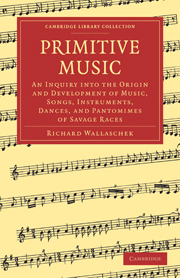 Primitive Music
Primitive Music Book contents
- Frontmatter
- PREFACE
- Contents
- CHAPTER I GENERAL CHARACTER OF THE MUSIC OF PRIMITIVE PEOPLE
- CHAPTER II SINGERS AND COMPOSERS IN PRIMITIVE TIMES
- CHAPTER III INSTRUMENTS
- CHAPTER IV THE BASIS OF OUR MUSICAL SYSTEM
- CHAPTER V PHYSICAL AND PSYCHICAL INFLUENCE OF MUSIC
- CHAPTER VI TEXT AND MUSIC
- CHAPTER VII DANCE AND MUSIC
- CHAPTER VIII PRIMITIVE DRAMA AND PANTOMIME
- CHAPTER IX ORIGIN OF MUSIC
- CHAPTER X HEREDITY AND DEVELOPMENT
- Summary
- List of quoted Authorities
- Index
- Plate section
CHAPTER III - INSTRUMENTS
Published online by Cambridge University Press: 29 August 2010
- Frontmatter
- PREFACE
- Contents
- CHAPTER I GENERAL CHARACTER OF THE MUSIC OF PRIMITIVE PEOPLE
- CHAPTER II SINGERS AND COMPOSERS IN PRIMITIVE TIMES
- CHAPTER III INSTRUMENTS
- CHAPTER IV THE BASIS OF OUR MUSICAL SYSTEM
- CHAPTER V PHYSICAL AND PSYCHICAL INFLUENCE OF MUSIC
- CHAPTER VI TEXT AND MUSIC
- CHAPTER VII DANCE AND MUSIC
- CHAPTER VIII PRIMITIVE DRAMA AND PANTOMIME
- CHAPTER IX ORIGIN OF MUSIC
- CHAPTER X HEREDITY AND DEVELOPMENT
- Summary
- List of quoted Authorities
- Index
- Plate section
Summary
The use of instruments in the first development of music (phylogenetically and ontogenetically) furnished the necessary hold and the equally necessary definiteness for the melodic frame-work. Further than this, however, the use of instruments does not seem to go, all subsequent development proceeding from vocal music. But in earliest times it required whole centuries before all the capabilities of even the most simple and primitive instruments were completely understood and made use of. Possibly this may in some degree account for the surprising antiquity of many comparatively complicated instruments, the full appropriate use of which would otherwise be quite incomprehensible. Concerning this antiquity the following archaeological discoveries furnish the desired explanation: At a meeting of the Archaeological Institute (3rd June, 1864) the Earl of Dunraven exhibited the bone of an animal of which the original use was at that time unknown. The report of the Archceological Journal states that it was thought to have formed part of a musical instrument or a crossbow. It was found in Ireland in a moat at Desmond Castle. Professor Owen pronounced the material to be a bone of the Irish elk (cervus alces); from this others drew further conclusions and declared the bone to be the remains of an “Irish lyra”. This last hypothesis is somewhat hazardous, but not at all because of the improbability that at the time of the Irish elk there were instruments which could be used for musical purposes.
- Type
- Chapter
- Information
- Primitive MusicAn Inquiry into the Origin and Development of Music, Songs, Instruments, Dances, and Pantomimes of Savage Races, pp. 80 - 138Publisher: Cambridge University PressPrint publication year: 2009First published in: 1893


